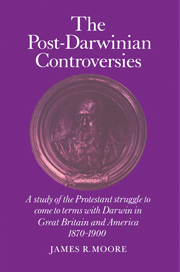 The Post-Darwinian Controversies
The Post-Darwinian Controversies Book contents
- Frontmatter
- Contents
- Dedication
- Preface
- PREFACE TO THE PAPERBACK IMPRESSION
- Introduction: the terrain of revision
- PART I HISTORIANS AND HISTORIOGRAPHY
- PART II DARWINISM AND EVOLUTIONARY THOUGHT
- PART III THEOLOGY AND EVOLUTION
- 9 Christian Anti-Darwinism: the realm of certainty and fixity
- 10 Christian Darwinisticism: the role of providence and progress
- 11 Christian Darwinism: the relevance of orthodox theology
- 12 Darwinism and Darwinisticism in theology
- Conclusion: on coming to terms with Darwin
- Dedication
- Notes to the text
- Bibliography
- Index
12 - Darwinism and Darwinisticism in theology
Published online by Cambridge University Press: 22 January 2010
- Frontmatter
- Contents
- Dedication
- Preface
- PREFACE TO THE PAPERBACK IMPRESSION
- Introduction: the terrain of revision
- PART I HISTORIANS AND HISTORIOGRAPHY
- PART II DARWINISM AND EVOLUTIONARY THOUGHT
- PART III THEOLOGY AND EVOLUTION
- 9 Christian Anti-Darwinism: the realm of certainty and fixity
- 10 Christian Darwinisticism: the role of providence and progress
- 11 Christian Darwinism: the relevance of orthodox theology
- 12 Darwinism and Darwinisticism in theology
- Conclusion: on coming to terms with Darwin
- Dedication
- Notes to the text
- Bibliography
- Index
Summary
It is no vulgar ‘act of faith’ that is at issue here, no ignoble acquiescence in orthodoxy or submission to an establishment. What is at issue is the faith in science itself, or in what passes as the necessary logic of science. The theory of natural selection is in many respects almost the ideal scientific theory: it is eminently naturalistic, mechanical, objective, impersonal and economical. … [Darwin] never doubted that he was a passive, disinterested observer accurately recording the laws revealed in nature. …
It was for this reason that Darwinism did not turn out to be the implacable enemy of religion that was first suspected. For Darwinism shared with religion the belief in an objective knowledge of nature. If religion's belief was based on revelation and Darwinism on science, with good will the two could be – as indeed they were – shown to coincide. The true challenge to orthodox religion came with the denial of the possibility of all objective knowledge. … Pre-Kant and pre-Kierkegaard, Darwinism appears as the citadel of tradition.
Gertrude HimmelfarbFor more than forty years after the publication of the Origin of Species evolutionary thought in Britain and America was in a state of great confusion. Theory vied with theory, philosophy with philosophy, to explain the manner in which life and matter had assumed its present forms. The theory of natural selection, which in Darwin's view described ‘the most important, but not the exclusive’, means of organic modification, was subjected not only to base and baseless theological attacks, but to some well-founded scientific criticisms.
- Type
- Chapter
- Information
- The Post-Darwinian ControversiesA Study of the Protestant Struggle to Come to Terms with Darwin in Great Britain and America, 1870-1900, pp. 299 - 345Publisher: Cambridge University PressPrint publication year: 1979


